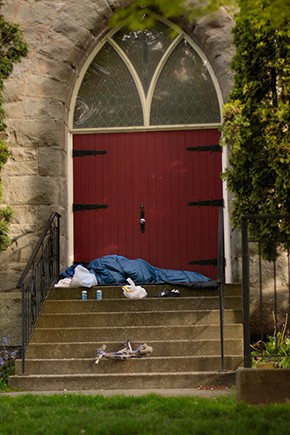Morning companions
Each morning I or a colleague open up our church in Trafalgar Square for a period of meditation before the service of morning prayer. It takes all my strength to move the heavy gates and a dose of humility to turn up for duty. When I was dean of a distinguished university chapel in the U.S., this kind of thing was well below my pay grade. It’s taken some getting used to, especially as the icy English winter has subsumed what we used to call spring.
Once I’ve opened the doors, a couple dozen shadowy figures follow me in, searching for warmth and sleep after a night outside. These ghosts are mostly from beyond the European Union. Their asylum claims have been turned down, and they aren’t regarded as refugees. Their status is NRPF—no recourse to public funds—which means spending the night on a city bus, in a dusky entranceway or on a friend’s floor. How gruesome their prospects must be in their own countries if this half-life is considered so much more desirable. For me, these people are a daily encounter with the face of Christ.
They are the shadow side of the welfare state. The benefit system isn’t a great burden on the nation if most people are working and paying taxes, but it’s tough for the treasury to make the sums add up when over half the population is receiving benefits. The treasury gurus are eager to stimulate the economy, cut taxes for businesses and wealth creators, and invest in infrastructure. But the first strand in a complex discussion is: Who will pay for this? Austerity creates its own ethic.





